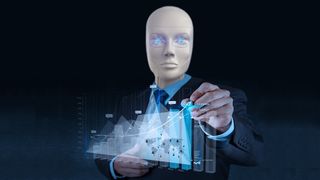AI could replace humans in cybersecurity by 2030
The robots are coming to defend against malware

A new study has revealed that many IT leaders are concerned that their jobs will be replaced by AI in the next ten years. In particular, there is a strongly held belief that cybersecurity roles will eventually be entirely automated, with no need for human intervention.
Following interviews with 500 UK IT decision-makers, Trend Micro found that more than two-fifths (41%) believe that AI will replace their role by 2030. The research demonstrates just how pervasive automation is expected to become in the workplace in the coming years.
Just 9% of the survey respondents said they were confident that AI would “definitely” not replace their jobs within the next ten years. Looking at specific IT sectors, 32% of respondents said that they believed that technology would eventually automate all cybersecurity.
- We've built a list of the best malware removal software around
- Check out our list of the best endpoint protection services available
- Here's our rundown of the best disaster recovery services on the market
No AI in team
It seems that we are never far away from yet another study warning of the huge number of expected job losses set to be caused by automation. But while certain industries will need to adapt to the rise of artificial intelligence, there needs to be some balance among the doom and gloom.
“We need to be realistic about the future. While AI is a useful tool in helping us to defend against threats, its value can only be harnessed in combination with human expertise,” said Bharat Mistry, Technical Director at Trend Micro.
“We shouldn’t worry about jobs becoming obsolete. The profession will certainly adapt and evolve in new ways. In the meantime, AI and automation can help us to alleviate the problems caused by critical skills shortages.”
The survey also found that 45% of IT bosses were planning to invest in further training and education next year. This sort of development will be crucial if individuals that are negatively impacted by AI can be re-deployed in other roles.
Are you a pro? Subscribe to our newsletter
Sign up to the TechRadar Pro newsletter to get all the top news, opinion, features and guidance your business needs to succeed!
- Here's our list of the best antivirus services right now
Barclay has been writing about technology for a decade, starting out as a freelancer with ITProPortal covering everything from London’s start-up scene to comparisons of the best cloud storage services. After that, he spent some time as the managing editor of an online outlet focusing on cloud computing, furthering his interest in virtualization, Big Data, and the Internet of Things.
Most Popular


